
"I Can't Get Next to You" is a 1969 No. 1 single recorded by the Temptations and written by Norman Whitfield and Barrett Strong for the Gordy (Motown) label. The song was a No. 1 single on the Billboard Top Pop Singles chart for two weeks in 1969, from October 18 to October 25, replacing "Sugar, Sugar" by the Archies and replaced by "Suspicious Minds" by Elvis Presley. The single was also a No. 1 hit on the Billboard Top R&B Singles for five weeks, from October 4 to November 1, replacing "Oh, What a Night" by the Dells, and replaced by another Motown song, "Baby I'm For Real" by the Originals.

"Baby I Need Your Loving" is a 1964 hit single recorded by the Four Tops for the Motown label. Written and produced by Motown's main production team Holland–Dozier–Holland, the song was the group's first Motown single and their first pop Top 20 hit, making it to number 11 on the US Billboard Hot 100 and number four in Canada in the fall of 1964. It was also their first million-selling hit single.
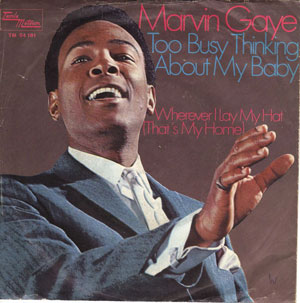
"Too Busy Thinking About My Baby" is a Motown song written by Norman Whitfield, Barrett Strong, and Janie Bradford. The song was first recorded by The Temptations as a track on their 1966 album Gettin' Ready. Eddie Kendricks sings lead on the recording, which was produced by Whitfield. Jimmy Ruffin also recorded a version with The Temptations providing background vocals in 1966. It remained unreleased until 1997.

"Angel of the Morning" is a popular song written by Chip Taylor, originally recorded by Evie Sands but which first charted with a version by Merrilee Rush. The song has been covered by many artists including Chrissie Hynde, Dusty Springfield, P. P. Arnold, Connie Eaton, Mary Mason, Guys 'n' Dolls, Melba Montgomery, Olivia Newton-John and Juice Newton, who reached the Billboard Top Ten with her version in the early 1980s.

"Proud Mary" is a song by American rock band Creedence Clearwater Revival, written by vocalist and lead guitarist John Fogerty. It was released as a single in January 1969 by Fantasy Records and on the band's second studio album, Bayou Country. The song became a major hit in the United States, peaking at No. 2 on the Billboard Hot 100 in March 1969, the first of five singles to peak at No. 2 for the group.

"Sunshine on My Shoulders" is a song recorded and co-written by American singer-songwriter John Denver. It was originally released as an album track on 1971's Poems, Prayers & Promises and later, as a single in 1973. It went to No. 1 on the Billboard Hot 100 chart in the U.S. in early 1974.

"Love Grows (Where My Rosemary Goes)" is the debut single by Edison Lighthouse. The song reached the number one spot on the UK Singles Chart on the week ending 31 January 1970, where it remained for a total of five weeks. It also became the first number one single of the 1970s (not counting Rolf Harris's "Two Little Boys" which was a holdover from 1969).
"If I Were a Carpenter" is a folk song written by Tim Hardin in the 1960s, and re-recorded with commercial success by various artists including Bobby Darin, The Four Tops and Johnny Cash. Hardin's own recording of the piece appeared on his 1967 album Tim Hardin 2. It was one of two songs from that release performed by Hardin at Woodstock in 1969. The song, believed by some to be about male romantic insecurity, is rumored to have been inspired by his love for actress Susan Morss, as well as the construction of Hardin's recording studio.
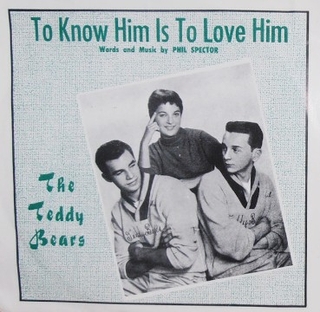
"To Know Him Is to Love Him" is a song written by Phil Spector, inspired by the words on his father's gravestone, "To Know Him Was to Love Him". It was first recorded by the only vocal group of which he was a member, The Teddy Bears. The single spent three weeks at No. 1 on the Billboard Hot 100 chart in 1958, while reaching No. 2 on the UK's New Musical Express chart. Peter & Gordon and Bobby Vinton later each experienced chart success with the song, in 1965 and 1968, respectively.
"Winchester Cathedral" is a song by the New Vaudeville Band, a British novelty group established by the song's composer, Geoff Stephens, and was released in late 1966 by Fontana Records.

Rhymes & Reasons is the first commercial studio album by the American singer-songwriter John Denver, released in October 1969 by RCA Records. It was reissued on CD by Legacy Recordings in 2005.
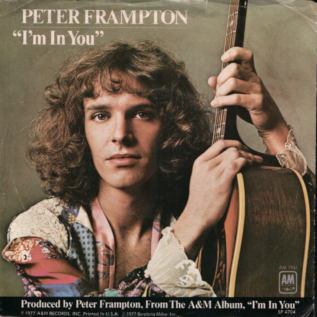
"I'm in You" is the hit song released by Peter Frampton as a single from his album I'm in You, released in 1977. The song is Frampton's biggest hit on charts around the world. It rose to No. 2 on the US Billboard Hot 100 for 3 weeks and No. 1 on the Cash Box Top 100 and in Canada.
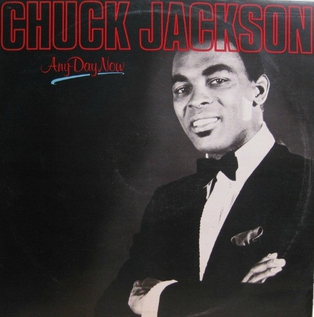
"Any Day Now" is a popular song written by Burt Bacharach and Bob Hilliard in 1962. It has been recorded by numerous artists over the years, including notable versions by Chuck Jackson in 1962, Alan Price in 1965, Elvis Presley in 1969, Scott Walker in 1973 and Ronnie Milsap in 1982. In the lyrics, the singer predicts the imminent demise of a romantic relationship and describes the sadness this will leave.

Paul Revere & the Raiders are an American rock band from Boise, Idaho. Formed in 1958, the band released their first hit single three years later, "Like, Long Hair", which reached number 38 on the U.S. Billboard Hot 100 chart. Following a few minor charting singles, including a version of "Louie Louie", the band worked with producer Terry Melcher in updating their sound, combining fast-paced, guitar-and-vocal-dominated rock and roll with an intimidating R&B flavor. The result was a string of commercially successful singles, beginning with 1965's "Steppin' Out" and continuing with "Just Like Me", which reached number 11 on the Hot 100, as well as "Kicks", "Hungry", and "Good Thing", all of which peaked inside the top 10. In addition, the band's three 1966 studio albums—Just Like Us!, Midnight Ride, and The Spirit of '67—were each certified gold in the United States.
"The Tip of My Fingers", also titled "The Tips of My Fingers", is a song written and originally recorded by American country music singer Bill Anderson. First included on his 1962 album Bill Anderson Sings Country Heart Songs, the song was a Top Ten country single for him in 1960.
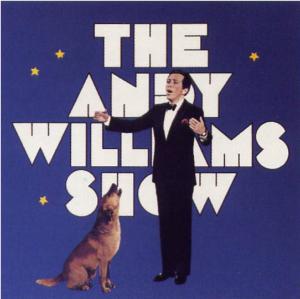
The Andy Williams Show is the twenty-sixth studio album by American pop singer Andy Williams, released in the fall of 1970 by Columbia Records. In his review on AllMusic, William Ruhlmann writes that "The Andy Williams Show LP was not a soundtrack recording from the TV series, and it was not really a live album, although it gets categorized as such. What appears to be the case is that Columbia Records took a group of Williams' studio recordings, most of them made during the summer of 1970 and consisting of his versions of recent soft rock hits, and added a lot of canned applause along with some of the kind of musical interludes used to usher numbers on and off on the show, including bits of its "Moon River" theme music at the start and the finish."
"Hurry Sundown" is a 1966 song written by Yip Harburg and Earl Robinson, and first recorded by the folk music trio Peter, Paul and Mary.
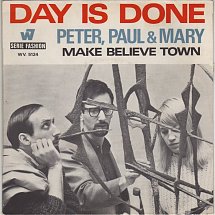
"Day Is Done" is a song written by Peter Yarrow. It was recorded by Yarrow's group Peter, Paul and Mary and released as a single in 1969. An anti-war protest song of the Vietnam War era, the song reached No. 21 on Billboard Hot 100, and was ranked No. 48 on the Billboard year-end Top Easy Listening Singles chart of 1969.
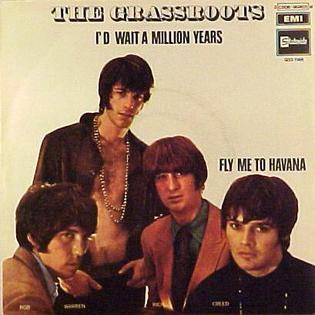
"(I'd) Wait a Million Years" is a 1969 hit single by The Grass Roots.
This is the discography of American folk group Peter, Paul and Mary.
















